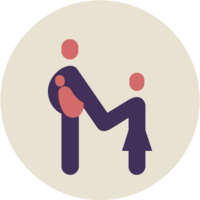As the sexual division of labour evolves in contemporary Western society, Paco Abril explores men's role in caregiving tasks and the significance of caring masculinities.
The traditional model of male breadwinner and the woman taking care of the private sphere has given way to dual-income households. Gender segregration however continues to persist in the labour market.
"Even though women have gradually increased the time they spend on paid work and have reduced the time spent on unpaid domestic work and care (with the opposite trend among men), the differences remain significant. In Spain, for instance, working women spend on average twice as much time on housework and caring for their children as men. Women take on the majority of care, which overloads them. That is to say, they have a second working day when they get home, or even three if we take into account the organisation and logistics of care, the mental load, tasks that are also generally performed by women" writes Paco Abril.
This also affects women's careers, leading them to ask for short work days or having to forgo promotions.







